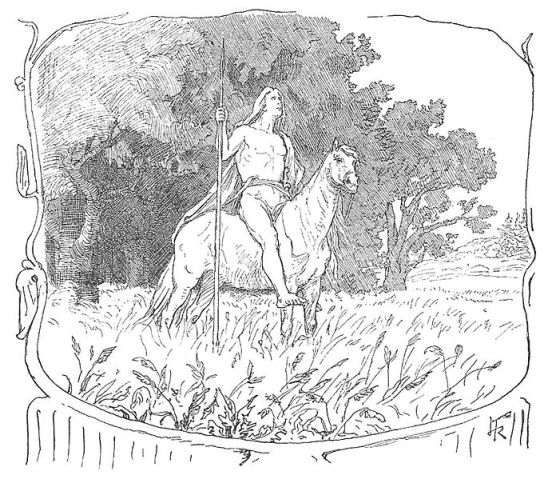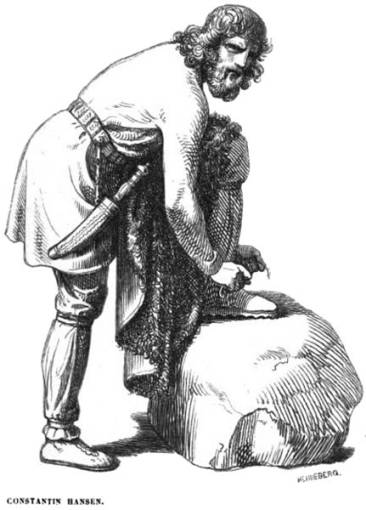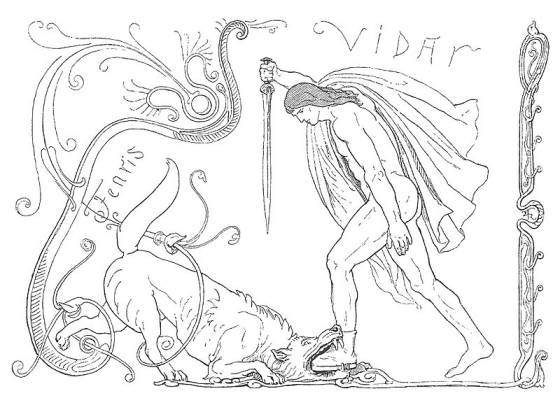The Aesir god Vidar, Old Norse Víðarr, walks through Norse mythology about as silently as he is described as being. Not much is ever said about him, other than that he is prophesied to kill the Fenris wolf, to avenge the death of Odin.
In the world of the Norse gods, I want to say that Vidar represents patience, honor and ultimate retribution. Much like his half-brother Váli, whos’ sole purpose is to avenge the death of Baldur, Vidar is largely only waiting for the end. I believe that this pre-destined fatalism was quite reflective of the beliefs held in Scandinavias Viking Age society.
Vidar Key Facts
| Parents | Odin and the giantess Grid (Gridr) |
| Partners | None known |
| Siblings | Thor, Balder, and others |
| Offspring | None known |
| Tribe | Aesir |
| Old Norse name | Víðarr |
| Other names | The Silent God |
| The God of | Vengeance, Silence |
Name and Etymology
The name “Vidar” in Old Norse is “Víðarr,” which can be roughly translated to “wide ruler.” “Víð” translates to “wide” or “expansive” and “Arr” is derived from the Old Norse word “ar,” which means “warrior” or “ruler.”
Thus, “Víðarr” can be interpreted as “Wide Warrior” or “Expansive Ruler.” I have to add that I feel something is missing in this common interpretation though. It would make more sense if the word Víð is understood as far-reaching, or maybe all-encompassing. Vidar is the warrior who will single handedly face down and kill the Fenris wolf. Certainly he deserves a name which reflects his power and prowess as the ultimate warrior.
Kennings for Vidar
Vidar is often referred to by various kennings, which are poetic circumlocutions used in Norse poetry. According to “Skaldskaparmal,” some of the kennings associated with Vidar include “The Silent God,” “Possessor of the Iron Shoe,” “Foe and Slayer of Fenris-Wolf,” “Avenger of the Gods,” “Divine Dweller in the Homesteads of the Fathers,” “Son of Odin,” and “Brother of the Aesir.”
These kennings not only highlight his silent nature but also emphasize his significant role in avenging the gods during the events of Ragnarok.
Vidar Origins

Vidar’s origins, particularly the circumstances surrounding his birth, remain shrouded in mystery within Norse mythology. Unlike many other gods whose tales of birth and early life are detailed in various sagas and eddas, Vidar’s beginnings are notably sparse. This lack of detailed origin stories adds to his enigmatic nature, further emphasizing his title as the “Silent God.”
However, there is a singular attestation to Vidar’s parentage found in the “Thorsdrapa” poem, which is a part of “Skaldskaparmal.” The poem recounts a tale where Thor visits the giantess Grídr, who is identified as the mother of Vidar. Grídr warns Thor about the cunning giant Geirrödr, advising him not to trust the giant. Recognizing the danger Thor might face, she lends him her Girdle of Might, her iron gloves, and her staff, known as Grídr’s Rod. This brief mention not only confirms Vidar’s parentage but also hints at the close relationship and trust between Grídr and the Aesir gods, particularly Thor and Odin.
The relationship between Odin and Grídr that led to Vidar’s birth is not elaborated upon in the known texts. This absence of information leaves room for speculation and interpretation, allowing Vidar’s character to be both a figure of strength and a symbol of the unknown within the Norse pantheon.
Siblings
Vídar, the silent god, is but one of the illustrious sons of Odin, each with their own unique tales and attributes. Among them is the mighty Thor, son of Odin and the jötun (giantess) Fjörgyn, renowned for his thunderous might and battles against the giants. Baldur, the beloved god of light and purity, and Höðr, the blind god of darkness, both hail from Odin’s union with Frigg. Váli, born with the sole purpose of avenging Baldur’s death, is the offspring of Odin and the jötun Rindr.
Bragi, celebrated for his eloquence and association with poetry, is believed to be the son of Odin and either the giantess Gunnlod or possibly Frigg. Heimdall, the vigilant guardian of the Bifröst bridge, Hermod, the brave messenger of the gods, Tyr, the god of war and justice, and Meili, associated with travel, further enrich this divine lineage. The fact that many of Odin’s partners, like Fjörgyn and Rindr, are jötun, underscores the intricate and often overlapping relationships between the Aesir gods and the jötnar. This diverse lineage highlights the multifaceted origins and roles of the gods in Norse mythology.
Vidar Family and Relationships
Vidar’s relationships, unlike many other gods, are not characterized by romantic entanglements. His most defining relationship is arguably with his father, Odin. This bond is highlighted during Ragnarok, the end of the world, where Vidar avenges Odin’s death.
There are no known offspring of Vidar. His narrative is more focused on his individual deeds and less on familial expansions. This is a common traits I find among several of the more peripheral of the Aesir gods. They have a single purpose that they are bound to, but not much else is known, or ever told about them.
Vidar Roles And Responsibilities
Among the Aesir, Vidar is seen as a steadfast protector, a god they can turn to in times of peril, much like Thor. His immense strength, second only to Thor’s, makes him an invaluable asset in the face of danger. But unlike Thor, whose adventures and battles are numerous and varied, Vidar’s purpose seems singular and focused; he is the destined avenger of Odin’s prophesied death.
This destiny is symbolized by his unique preparation. Vidar possesses a thick shoe, crafted from leftover pieces of leather collected all across Midgard. Throughout his existence, he adds to this shoe, ensuring it’s immensely strong. This isn’t for everyday battles or skirmishes but for one pivotal moment in the future; his fated confrontation with the Fenris wolf during Ragnarok. This shoe, a testament to his preparation and foresight, will play a crucial role in that battle, aiding him in avenging his father’s death.
For humans, Vidar’s role transcends the tales of gods and giants. He embodies the spirit of hope, especially when faced with insurmountable challenges. His story assures mankind that vengeance and justice will prevail, even when the odds seem overwhelmingly against them. In a world where chaos and unpredictability reign, Vidar stands as a symbol of silent resilience and retribution.
Depiction And Characteristics
Vidar, in the vast realm of Norse mythology, is often depicted as the embodiment of silent strength and unwavering readiness. He doesn’t indulge in grand speeches or flamboyant displays. Vidar instead, is the stoic observer, always prepared for the battle that he knows is inevitable. This characteristic silence, however, should not be mistaken for passivity. His quiet demeanor is a mask for the storm of vengeance within him, waiting for the right moment to unleash.

His preparedness and dedication to his purpose are evident in the way he constantly adds to his thick shoe. In so doing he is ensuring it’s ready for the pivotal confrontation with the Fenrir wolf. This act of continuous preparation highlights his foresight and determination to fulfill his destiny.
Odin, in the “Grímnismál” poem from the “Poetic Edda,” provides a glimpse into Vidar’s nature and his dwelling place. The stanza paints a vivid picture of Vidar’s land, filled with brushwood and high grass. More importantly, it emphasizes Vidar’s resolve, as he proclaims, even in the tranquility of his land, his keenness to avenge his father. This proclamation, made from the back of his horse, underscores his readiness and the weight of the responsibility he carries.
Symbols
Vidar’s most iconic symbol is his thick shoe, a unique artifact with a purpose deeply rooted in Norse mythology. This shoe isn’t crafted from ordinary leather but is meticulously pieced together from the scrap leather that people cut off their shoes. These scraps, which would otherwise be discarded, are collected and added to Vidar’s shoe, reinforcing its strength and significance.
Every piece of leather symbolizes the collective contribution of mankind, each adding to its might. This shoe, therefore, is not just a testament to Vidar’s readiness for his destined confrontation with the Fenris wolf. Moreover it also represents the collective hope and resilience of humanity, preparing for the challenges of the future.
Play Fun Norse Quiz
Is this article making you even more curious about Norse gods and goddesses? You can satisfy your curiosity by playing a fun Norse mythology quiz. This way, you can test your knowledge about Norse gods and goddesses, as well as fill in some gaps. Good luck and have fun playing!
You might be interested in this fun game too! It reveals the parentage of Vidar and other sons (and daughters) of Odin:
Don’t forget to try our other games as well!
Myths about Vidar
Vidar’s destiny is intrinsically tied to the events of Ragnarök, the end of the world in Norse mythology.
Battling the Fenris Wolf
Among the most pivotal moments during this cataclysmic event is the confrontation between Vidar and the monstrous wolf, Fenrir. As foretold, Fenrir will bring about the death of Odin, Vidar’s father. In retaliation, Vidar, equipped with his unique shoe, will face the beast. Demonstrating his immense strength and the significance of his shoe, Vidar will step down with one foot on the wolf’s lower jaw.

Depending on the source, he next either grabs Fenrir’s upper jaw with one hand literally rips him apart (Vafthrudnismal) or he stabs the beast right in the heart (Völuspá). Finally fulfilling his destiny, avenging Odin’s death. This act of vengeance is not just a personal vendetta but also a symbol of hope and resilience against overwhelming odds. Vidar’s shoe, crafted from the extra leather pieces that people have cut from their shoes, plays a crucial role in this battle. It’s a testament to the collective strength of humanity, as every discarded piece of leather adds to its might.
Survivor of Ragnarök
The aftermath of Ragnarök is a world reborn, but not all gods are destined to witness this new beginning. Vidar, however, is among the few who will. Alongside his brother Váli, Vidar will emerge unscathed from the fiery onslaught unleashed by Surtr and the subsequent deluge that engulfs the world.
The two will find themselves on the plain of Iðavöllr, the very place where the majestic city of Asgard once stood. Their survival is symbolic of endurance and the undying spirit of the gods, even in the face of total annihilation. As the world starts anew, Vidar and Váli stand as beacons of hope, continuity, and the enduring legacy of the Aesir.
Mentions in Ancient Texts
In Norse mythology, the Poetic Edda and the Prose Edda serve as foundational texts, illuminating the tales and roles of various gods, including Víðarr. Through these ancient writings, we gain a deeper understanding of Víðarr’s significance and character. Let’s explore these mentions further.
Poetic Edda
The Poetic Edda, a collection of Old Norse poems, provides several mentions of Víðarr, shedding light on his character, roles, and significance in Norse mythology.
Völuspá
In the Völuspá, a völva recounts the future events of Ragnarök to Odin. Stanzas 54 and 55 vividly describe Víðarr’s role in avenging his father’s death:
“Then comes Sigfather’s mighty son, Vithar, to fight with the foaming wolf; In the giant’s son does he thrust his sword Full to the heart: his father is avenged.”
Vafthrúdnismál
In the Vafthrúdnismál, the giant Vafþrúðnir speaks of the fate of the gods after Ragnarök. He mentions:
“In the gods’ home Vithar and Vali shall dwell, When the fires of Surt have sunk; Mothi and Magni shall Mjollnir have When Vingnir falls in fight.” And further emphasizes Víðarr’s role: “The wolf shall fell the father of men, And this shall Vithar avenge; The terrible jaws shall he tear apart, And so the wolf shall he slay.”
Grímnismál
Odin, in the Grímnismál, provides a glimpse into Víðarr’s dwelling:
“Brushwood grows and high grass widely in Vidar’s land and there the son proclaims on his horse’s back that he’s keen to avenge his father.”
Lokasenna
In the Lokasenna, Loki confronts the gods during a feast. Víðarr’s calm demeanor is evident as he pours a drink for Loki, adhering to the rules of hospitality despite Loki’s provocations.
Prose Edda
The Prose Edda, written by Snorri Sturluson, offers a more structured account of Norse myths, including detailed descriptions of Víðarr.
Gylfaginning
In Gylfaginning, Víðarr’s characteristics and roles are elaborated upon. He’s introduced as “the silent god” with a thick shoe, almost as powerful as Thor. His pivotal role during Ragnarök is highlighted, where he avenges Odin’s death by confronting Fenrir. The significance of his shoe, made from the discarded leather pieces of mankind, is also emphasized.
Skáldskaparmál
In Skáldskaparmál, Víðarr is mentioned as one of the twelve presiding gods at a banquet. Snorri, in a unique euhemeristic interpretation, even compares Víðarr to the Trojan hero Aeneas. He is drawing parallels between their roles as both avengers and survivors of great wars.
These texts, both poetic and prose, offer a comprehensive insight into Víðarr’s character. They highlight both his roles in the Norse pantheon, and his significance in the overarching narrative of Norse mythology.
FAQs
Vidar avenges his father Odin’s death by killing the wolf Fenrir during Ragnarok.
No specific animal is directly associated with Vidar in the myths.
He is known for his stoic nature and rarely speaks in the myths, emphasizing his silent strength.
Vidar is the son of Odin and the giantess Grid.
There are no known partners or offspring associated with Vidar.
His shoe, made from leather scraps, plays a crucial role in his vengeance against Fenrir during Ragnarok.
Featured Image Credit: W.G. Collingwood, Public domain, via Wikimedia Commons
